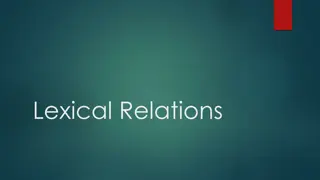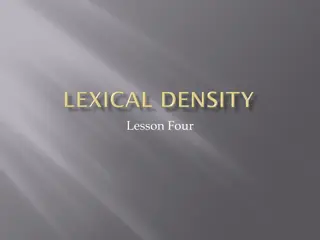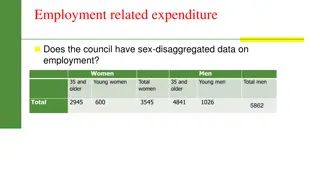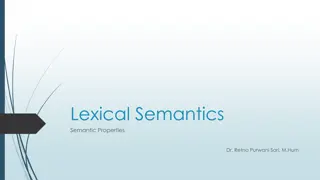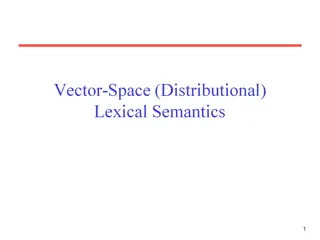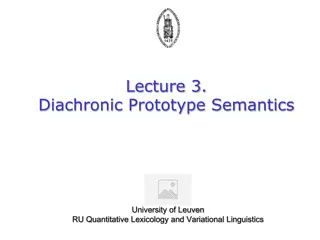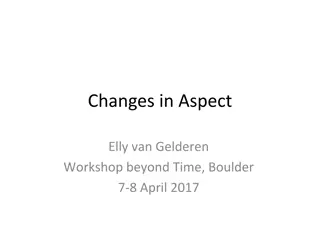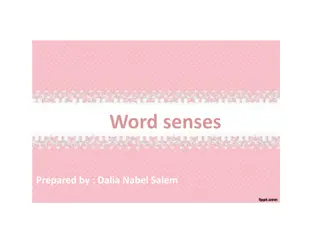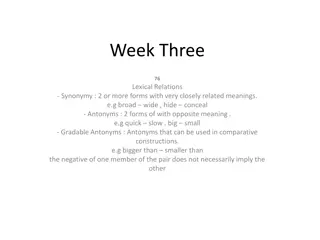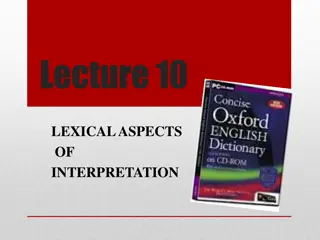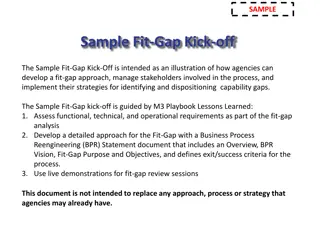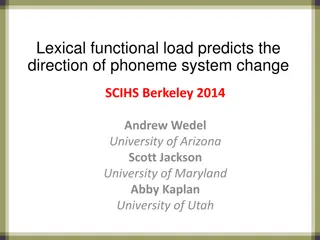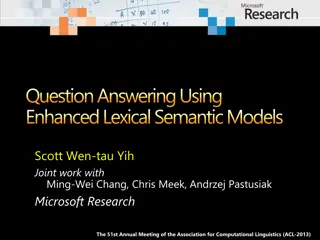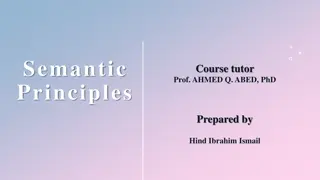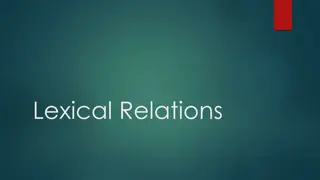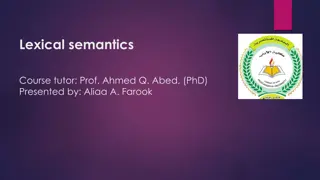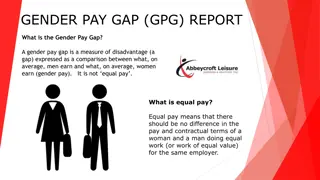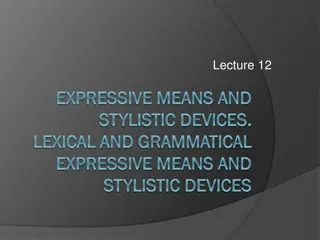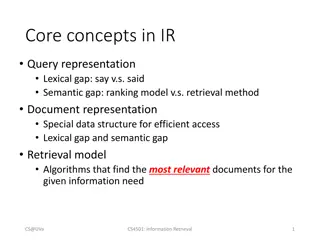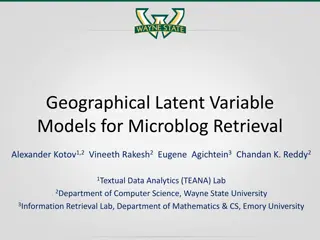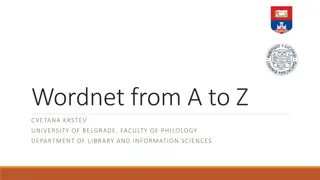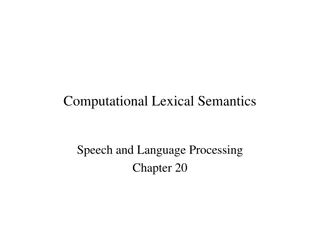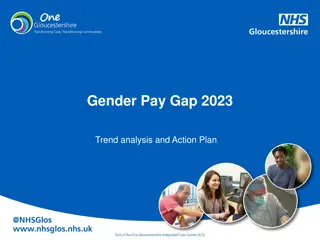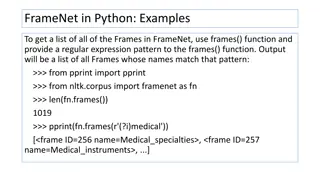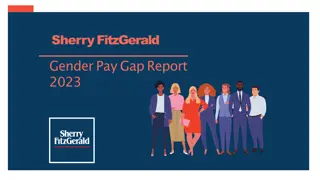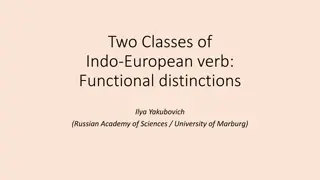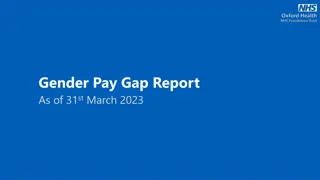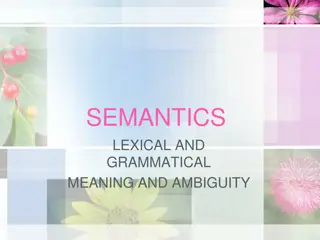Understanding Semasiology: The Study of Word Meaning
Semasiology is a branch of linguistics focused on the meaning of words. It delves into various aspects of lexical meaning, semantic development, polysemy, and semantic structure. Through exploring types of word meanings and semantic changes, semasiology helps us comprehend the intricate nuances of l
4 views • 19 slides
Understanding Lexical Relations: Synonyms, Antonyms, Hyponymy, and Prototype
Explore the concepts of synonyms, antonyms, hyponymy, and prototype in lexical relations. Learn how closely related words can be substituted for each other, understand opposites, inclusion in meanings, and characteristic instances in word categories.
0 views • 12 slides
Understanding Predicators and Predicates in Sentence Semantics
Exploring the semantics of sentences, this content delves into the structure of declarative sentences in terms of predicators and arguments. It discusses various classes of items that can function as the predicator of a sentence, such as lexical verbs, the copulative verb "be" in equative sentences,
1 views • 39 slides
Understanding Lexical Density in Text Analysis
Explore the concept of lexical density by analyzing the proportion of content words in a text. Learn how lexical density impacts clarity and interpretation using examples with varying levels of lexical density. Gain insights into the significance of lexical words and how they contribute to the meani
5 views • 34 slides
Gender Pay Gap Analysis and Parity Initiatives in City of Harare
The City of Harare has sex-disaggregated data on employment showing disparities in earnings between men and women. The average monthly earnings for full-time and casual positions reveal a gender wage gap of 0.96%. Reasons for this gap include job segregation and manual labor preferences, affecting w
1 views • 8 slides
Understanding Semantic Properties in Lexical Semantics
Explore the concept of semantic properties in lexical semantics through examples involving word meanings and relationships. Learn how semantic properties form the basic building blocks of language construction, sharing common attributes among words while also showing contrastive distinctions. Dive i
0 views • 17 slides
Exploring the Benefits of Taking a Gap Year After High School
Discover the various opportunities and benefits of taking a gap year post-high school, including insights from counselors and graduates, options for programs like academic courses, community service, and travel experiences, along with suggestions on how to start and what questions to ask when consid
0 views • 11 slides
Understanding Word Meaning through Vector Space Models
Explore how Vector-Space (Distributional) Lexical Semantics represent word meanings as points in a high-dimensional space. Learn about Semantic similarity, creating sample lexical vector spaces, and using word vectors to measure semantic relatedness. Discover how other contextual features and featur
0 views • 33 slides
Evolution of Lexical Categories: A Cognitive Sociolinguistics Perspective
The lecture series at the University of Leuven explores Diachronic Prototype Semantics and its implications for Variational Linguistics. It delves into semasiological, conceptual onomasiological, and formal onomasiological variation in linguistic meaning, emphasizing the role of variability in the e
2 views • 67 slides
Understanding Changes in Aspect: Workshop Highlights by Elly van Gelderen
Explore the systematic changes in verb meaning due to aspect and theta-roles, the influence of lexical and grammatical aspect on each other, and the significance of telic, durative, and stative aspects in language. Discover insights on children's early awareness of aspectual verb classes and their c
0 views • 77 slides
Understanding Polysemy and Homonymy in Lexical Ambiguity
In lexical ambiguity, polysemy refers to one word having multiple related senses, while homonymy involves different words that sound the same but have unrelated meanings. Distinguishing between polysemy and homonymy can be challenging, but certain guidelines can help differentiate them based on shar
0 views • 27 slides
Understanding Lexical Relations in Linguistics
Different types of lexical relations such as synonymy, antonyms, hyponymy, homophony, and homonymy play a crucial role in understanding the nuances of language. Synonyms have closely related meanings, antonyms have opposite meanings, while hyponymy and hypernymy show hierarchical relationships betwe
0 views • 4 slides
Lexical Aspects of Interpretation: Focuses of Meaning
This discussion explores the concept of "focuses of meaning" in interpretation, emphasizing how interpreters memorize and reconstruct oral messages around key elements such as subject field terms, set phrases, and precision lexicon. The necessity of understanding terminology in various subject field
0 views • 28 slides
Understanding Word Meaning in Lexical Semantics
Introduction to Chapter 5 Lecture 4.1 discusses the nature of word meaning, major problems of lexical semantics, and different approaches. It explains the concept of a word, prototypical words, lexical roots, lexemes, and word forms, highlighting the importance of the word as a lexeme in lexical sem
1 views • 20 slides
Sample Fit-Gap Kick-Off Approach for Agencies
Illustration of how agencies can develop a fit-gap approach, manage stakeholders, and identify capability gaps through a Sample Fit-Gap Kick-Off guided by M3 Playbook Lessons Learned. The kick-off includes assessing requirements, developing a detailed approach with a BPR statement, and using live de
0 views • 9 slides
The Influence of Lexical Functional Load on Phoneme System Changes
The study explores how the functional load of phoneme contrasts affects the trajectory of phoneme system changes over time. Researchers examine phoneme mergers in nine languages, finding an inverse correlation between the number of minimal pairs and mergers. The model is refined to investigate diffe
2 views • 26 slides
Enhanced Lexical Semantic Models for Question Answering - ACL 2013 Study
Utilizing enhanced lexical semantic models, this study presents approaches for sentence selection in question answering tasks, emphasizing tree-based techniques like tree edit-distance and quasi-synchronous grammar to match dependency trees. It discusses challenges in dependency tree matching, compu
0 views • 34 slides
Understanding Language Principles: Semantic and Syntactic Analysis
Language users rely on semantic principles like open choice and idiom to understand utterances, while syntactic analysis helps in grasping sentence structure. The interplay between lexical and phraseological features shapes language comprehension, showcasing tensions like in aspectual and idiomatic
0 views • 16 slides
Building interactive interpreter for Calculator Language with REPL, Parsing, and Lexical Analysis
This project involves creating a user interface similar to a Read-Eval-Print Loop (REPL) for programming languages. Users can input text representations of expressions, which are then parsed, evaluated, and errors are handled accordingly before displaying the expression's value. Additionally, the st
0 views • 22 slides
Understanding Lexical Relations in Language
Explore the concepts of synonymy, antonymy, hyponymy, and prototype in linguistics. Learn about words with closely related meanings (synonyms), opposite meanings (antonyms), inclusive meanings (hyponyms), and characteristic examples (prototypes) within lexical relations.
0 views • 12 slides
Understanding Lexical Semantics: An Overview
Lexical semantics explores the relationships words have with each other and with our understanding of reality. It delves into reference and sense, naming theory, synonymy, and more. Reference focuses on how words relate to objects, while sense deals with relationships between lexical items. Naming t
0 views • 10 slides
Understanding Gender Pay Gap Report at Abbeycroft Leisure
Gender Pay Gap (GPG) Report at Abbeycroft Leisure reveals a mean gender pay gap of -13.52% and a median gap of -3.81%. While women earned more on average than men, there was no bonus gender pay gap due to no bonuses paid in the relevant period. The composition of the workforce, bonus gender pay gaps
0 views • 7 slides
Gender Pay Gap Data Analysis at NICE - 2022/23
Delve into the gender pay gap data analysis at NICE for the reporting period of 2022/23, highlighting a mean gender pay gap of 7.36%, improvements in gender equality, disparities faced by women, and plans for further reducing the gap in 2024.
0 views • 10 slides
Understanding Lexical and Grammatical Expressive Means in Stylistic Devices
The lecture discusses various lexical and grammatical expressive means in stylistic devices, such as metaphor, personification, allusion, metonymy, synecdoche, irony, epithet, and oxymoron. These tools allow for creative and vivid expressions in language by playing with different meanings and associ
0 views • 22 slides
Understanding Core Concepts in Information Retrieval: Lexical and Semantic Gaps, Retrieval Models, and Algorithms
Explore the core concepts in Information Retrieval (IR) including lexical gaps like 'say' vs. 'said', semantic gaps, ranking models vs. retrieval methods, special data structures for efficient access, and algorithms for finding relevant documents. Understand the differences between IR and databases,
0 views • 46 slides
Geographical Latent Variable Models for Microblog Retrieval
Addressing challenges in microblog retrieval such as vocabulary mismatch and multi-faceted relevance signals. Explore opportunities in leveraging lexical and non-lexical information, including geographical meta-data. Discuss prior work on utilizing timestamps and re-tweets, while also highlighting t
0 views • 19 slides
Overview of WordNet: History, Definition, Authors, and Usage
WordNet is a lexical database for the English language, grouping words into synonym sets, providing definitions, and recording relations among these sets. It serves as a dictionary and thesaurus, with primary use in text analysis and AI. Created at Princeton University under George Miller and direct
0 views • 59 slides
Gender Pay Gap Report for Linley & Simpson Ltd: Insights and Commitments
This report presents the gender pay gap data for Linley & Simpson Ltd as of 5th April 2022, highlighting a 46% ordinary pay gap and detailing efforts towards aligning pay for jobs of equal value. The company emphasizes fair pay, diversity, inclusion, and development opportunities. Factors impacting
0 views • 6 slides
Understanding Word Sense Disambiguation in Computational Lexical Semantics
Explore the intricate world of word sense disambiguation in computational lexical semantics, covering supervised and unsupervised techniques, lexical sample and all-words tasks, and various approaches such as knowledge-based and machine learning. Delve into the complexities of interpreting different
0 views • 94 slides
Gender Pay Gap Analysis and Action Plan for 2023
The gender pay gap persists, with women earning significantly less than men due to various factors including caring responsibilities, low-skilled jobs, part-time work, and discrimination. In 2023, the national median pay gap stands at 9.4%. NHS Gloucestershire ICB has reported a mean gender pay gap
0 views • 7 slides
Understanding Poverty, Racial Wealth Gap, and Tax Fairness
This training program is designed to review basic information on poverty, inequality, and the racial wealth gap, understand the creation and perpetuation of the racial wealth gap, learn about policy tools to narrow the gap, and empower individuals to take action towards ending hunger and poverty. Th
0 views • 52 slides
Working with FrameNet in Python
Examples provided demonstrate how to access FrameNet data in Python using functions like frames(), frame(), lus(), and lu(). You can search for specific frames, get details of individual frames, lexical units, and roles in FrameNet. The content showcases how to retrieve information on medical frames
0 views • 12 slides
Gender Pay Analysis at Savills Management Resources Ltd
The 2018 Gender Pay Gap analysis for Savills Management Resources Ltd reveals a mean hourly full pay gap of -1.3% and a median hourly full pay gap of -12.3%, both favoring female employees. However, the mean bonus pay gap slightly favors male employees by 0.1%, while the median bonus pay gap favors
0 views • 4 slides
Gender Pay Gap Report 2023: Sherry Fitzgerald Analysis & Actions
The Gender Pay Gap Report 2023 by Sherry Fitzgerald reveals a 29% mean gap and a 30% median gap in hourly remuneration between men and women, showing improvement from the previous year. The report highlights the distribution of male and female employees across pay quartiles and bonus remuneration pe
0 views • 6 slides
Understanding Lexical Relations in Language
Lexical relations play a crucial role in understanding the meanings of words in any language. They encompass relationships like entailment, paraphrase, and contradiction, shedding light on how lexemes are interconnected. Additionally, lexical fields and kinship systems offer further insights into ho
0 views • 10 slides
Functional and Lexical Distribution of Indo-European Verbs
Investigating the functional and lexical distribution of Indo-European verb classes, this research delves into the mi- and xa-conjugations in Proto-Indo-European, new discoveries in the preterit of the xa-conjugation, paradigms in Hittite, perfect and middle endings in Late Indo-European, and the ch
0 views • 18 slides
Understanding the Effects of Air Gap Tolerance on Inductance Tolerance
This technical note delves into the impact of air gap tolerance on inductance tolerance in transformer manufacturing. It explains how controlling the core's air gap dimension is crucial for maintaining desired inductance levels within manufacturing constraints. The text discusses the small scale of
1 views • 10 slides
Gender Pay Gap Report Summary as of 31st March 2023
The Gender Pay Gap Report as of 31st March 2023 for Oxford Health NHS FT highlights the difference in average earnings between men and women. Employers with 250 or more employees are required to comply with gender pay gap reporting regulations. The report includes data and calculations for mean and
0 views • 11 slides
Understanding Semantics, Lexical, and Grammatical Meaning
Exploring the nuances of semantics, lexical meaning, and grammatical meaning, this content delves into the distinctions between them, the role of lexemes, and the complexities associated with words. It discusses the various kinds of meanings expressed at the lexical and grammatical levels, including
1 views • 37 slides
Exploring the Benefits of Taking a Gap Year
A gap year is a valuable opportunity to step out of formal education or work to travel, gain new experiences, and prepare for the future. Discover the reasons to consider a gap year, how it can enhance personal growth and readiness for university, and what universities have to say about its advantag
0 views • 22 slides

